Our October newsletter opens with a statement from Professor Ray Jones, the Lead Reviewer for the Independent Review of Northern Ireland’s Children’s Social Care Service in Northern Ireland, at this halfway stage of sixteen-month period of the Review.

It is now already half-way through the sixteen months (February 2022 - June 2023) Independent Review of Northern Ireland’s Children’s Social Care Service and it may be timely to do a little reflecting and stock taking.
First, a BIG thank you to everyone involved in and with children’s social care services in different ways for the time, experiences, advice, and wisdom you have shared with me – children and young people, parents and family carers, foster carers, adopters, practitioners, managers and leaders across statutory children’s services and within the community and voluntary sector right across the region, trade unions (NIPSA and Unison) and the British Association of Social Workers, social work students and educators and researchers, policy makers and other colleagues in the Department of Health (DoH) , and those in schools, the judiciary, and other agencies who work with and alongside children’s social care services. I am truly grateful.
And thank you to the Voice of Young People in Care (VOYPIC) for facilitating my engagement with children and young people, to Children in Northern Ireland (CiNI) for helping with my meetings with parents and carers and with community and voluntary sector (C&VS) organisations, to the Fostering Network for making links for me with foster carers and independent fostering agencies, and to the Review’s advisory panel and secretariat for helping shape the Review and for keeping the Review on track and on the road.
So, what has it been like? Well, not always straightforward!
The Review was launched during what were still the limitations of Covid lockdowns with meetings having to be postponed or re-routed on-line as infections were still quite rampant (and as I sit here typing today with Covid for the second time this is clearly not behind us!). And I have had the joy of many hours at Bristol and Belfast International airports with fingers crossed, not always successfully, that EasyJet will fly me.
CHANGES SINCE THE REVIEW STARTED
But the most significant unexpected events during the eight months so far of the Review have been the political and leadership changes impacting on children’s social care.
Just after the Review started the Northern Ireland Assembly was dissolved and there has been no functioning Executive since, although I have much appreciated the continuing commitment and interest of the Minister of Health.
There has been a change of Permanent Secretary in the Department of Health (and I am grateful that the new Permanent Secretary has demonstrated considerable commitment to the Review), and recently there has been the change of Deputy Permanent Secretary and Chief Social Worker.
There has also been the organisational change with the migration of what was the Health and Social Care Board into the Department of Health (DoH) with the creation of the Strategic Planning and Performance Group (SSPG), which also has had significant internal changes over recent months.
And within the five Health and Social Care Trusts (HSCTs) since February one Director of Children’s Services (DCs) was and is an interim appointment and three have resigned. The majority of DCSs are now interim appointments.
Amid all these changes it has been especially important and beneficial in anchoring the Review, without any compromise or challenge at all to my independence as the Lead Reviewer, to have had the engagement with the Director of Family and Children’s Policy in the DOH who is widely respected for her experience and expertise.
THE REVIEW’S PLANNED PHASES
The Review is now into phase three of its programme. Phase one (February-April) included meeting the regional infrastructure organisations for children’s social care, getting out and about across the region into each Trust and meeting leaders, managers and practitioners (I have probably met more than 600 social workers), spending evenings in children’s homes, and visiting regional children’s residential facilities.
Phase two (May-July) included meeting lots of children and young people and parents and other family members, foster carers, meeting with C&VSs and visiting their services, and engaging with schools, the police, public health workers, judges, and others working with and alongside children’s social care.
Phase three (August and continuing) includes drilling down into practice, and through a series of workshops – each attended by about 90 people - checking I am spotting the most significant issues and whether my direction of thinking is sensible. Workshops have or are being held on disabled children and their families; looked after children; family support; the social care workforce; and the organisation and delivery of children’s social care.
Phases four and five in the new year will include beginning to shape the Review report and filling in the gaps in my understanding and thinking and then preparing the final report by June 2023.
To assist the Review briefing papers are being prepared on the changes in statutory children’s social care in Northern Ireland since 2000; an overview of family support services; comparative trends and patterns in children’s social services from across each of the UK administrations and the Republic of Ireland; comparative analysis of children’s social care budgets and expenditure; and children’s social care workforce comparisons.
THE SERIOUS CRISIS IN CHILDREN’S SOCIAL CARE
But I have been heard to say I see little point in just preparing another review report (although of course I will!). There are many other reviews currently underway but there is a history of many past reports not delivering what they intended and lying on the shelf waiting to be read by the next reviewer.
In this context it particularly concerns me that there is a continuing political vacuum with urgent issues which need to be addressed and needing the decisions of a functioning Executive, which are drifting and without actions, especially regarding increasing poverty, the government funding of public (and therefore also C&VS) services, and the impact of the ending of European Community grants for C&VSs.
A major concern should be that there is a serious crisis in children’s social care services. This is not just my view. It is what I am told in meetings and in individual conversations with young people and families. It is what I am told by practitioners and managers. It is what I am told by those working with and alongside the services
It is a significant serious crisis which is endemic, and it is systemic. It is endemic in that it is long standing. It is systemic in that it is right across the region and every HSCT. It is not about the failings of individuals. It is structural. But it is fixable.
It is characterised by thousands of children and families who have crossed a threshold of being recognised as needing the involvement of children’s social services but who have not been allocated to anyone to work with and to assist them from within the HSCTs’ children’s social care services.
This should be no surprise when there are workforce vacancies of 30-40% across children’s social care teams. Even some of those children and families who may have an allocated worker may see little activity because of the workload pressures or they may see no continuity of worker because of the churn within the workforce.
Within the HSCTs there are understandable and inevitable major concerns about the pressures and waiting times within hospital and health services. It should not be a surprise that despite considerable board and top leadership commitment children’s social care may not be the biggest of the issues taking time and attention and needing to be tackled. Directors of Children’s Services are then distracted from and squeezed in their focus and grip on children’s social care amid bigger corporate agendas and service responsibilities.
There also sometimes seems to be a tension between the DoH wanting to achieve consistency of services and standards across the region and the HSCTs and DCSs wanting to take action within their areas without needing to reference or seek permission from the Department of Health.
SO WHAT TO DO?
Action is already being taken to increase the skills mix within frontline children’s social care teams both to support social workers and, importantly, to provide more help for children and families. And DCSs have been given the necessary space to take actions without having to seek the approval of the DoH in, for example, setting aside some of the procedural recording and reporting requirements to free up more time for direct work with children and families and to reduce the backlog of work.
The Minister of Health recently announced an embargo from June next year on the employment of agency social workers, with opportunities before then for agency workers to gain permanent posts, and this should help reduce the changes and churn in social workers experienced by families.
ONE CHILDREN’S SOCIAL CARE SERVICE FOR NORTHERN IRELAND
But there is a bigger issue. It is now my clear view – and which having checked with many others I am not alone – that the endemic and systemic serious crisis in children’s social care in Northern Ireland requires structural change. Rather than children’s social care being a minor and may be marginal part of what are very busy and pressured Health and Social Care Trusts, there should be one children’s social care body for Northern Ireland (one DOH Arm's Length Body - ALB- within Northern Ireland’s arrangements), albeit with local delivery of services through geographical divisions based on the HSCTs areas.
I have shared and explained this view and recommendation with the Minister of Health and Permanent Secretary but without an operational Executive it is not a decision which can be taken at this time. What has been initiated is an option appraisal, which includes the option of a new ALB, within the Department of Health to inform hopefully a decision to be taken in the New Year (and before the completion of this Review).
A region-wide children’s social care ALB also offers the scope to push forward with increased focus and energy with partners on developing more multi-professional children and families frontline services and teams rather than professional silo working.
A region-wide children’s social care ALB would also help progress to be made regarding regional children’s services, such as implementing the outstanding review recommendations regarding Northern Ireland’s Secure Care Centre (Lakewood) and Juvenile Justice Centre (Woodlands). I have met with the Ministers of Health and Justice and shared thoughts on how to move forward more quickly on implementing the recommendations of the Regional Facilities Review, including the recommendation to establish a single Secure Care and Justice Centre in place of the current separate arrangements.
MORE TO DO
There are many other concerns which will be addressed through the Independent Review of Children’s Social Services – how to get more practical help to families; how to value more and to utilise the expertise based on experience of young people and parents for the benefit of each other; how to give more security and certainty to the provision and funding of CVS services; how to stabilise the care of children; how to not only educate and train and recruit but also how to retain more social workers in children’s services, but also within a wider skills mix; how to re-balance an overwhelming focus on the safety of children and child protection to a children’s and families service; how to make it less likely that young people who are disabled or care experienced will feel and be stranded from services as they move into adulthood … and other themes and issues.
I am aware this Review will have (rightly) raised expectations. I am also aware that there are no magic and quick solutions to every issue which needs to be addressed. But I do think there are some quicker fixes for some issues and that a solid and secure region-wide organisational platform and foundation can and should be put in place to allow progress on sorting the issues not amenable to quick fixes. This may need political will and action and I hope this is in place and decisions have been taken before this Review’s final report is published next June.
ENGAGEMENTS
Professor Jones, Lead Reviewer, continued his programme of meetings and visits over the month of October. The programme has included follow up meetings with Trust Chief Executives and Directors of Children’s Services to discuss the progress of the Review to date. Professor Jones visited Hydebank Prison to meet with male prisoners to hear about their experiences of children’s social care. He also visited Lakewood Secure Care and Woodlands Juvenile Justice Centre to meet with young people and staff to observe services on the ground and to hear about their experiences. Meetings took place with the Minister of Health, Robin Swann and the Minister of Justice, Naomi Long along with Department of Health Permanent Secretary, Peter May to discuss his Interim Review Paper.
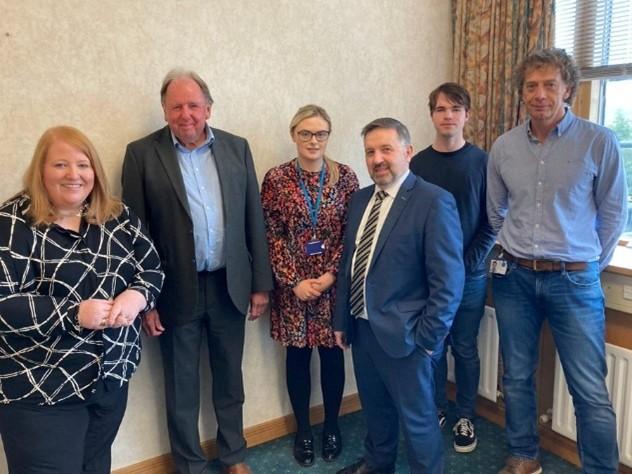
Professor Jones also met with the Deputy Secretary of Social Services Policy Group, Peter Toogood and Strategy Director for Social Work and Social Care Workforce, Jackie McIlroy. Discussions have also taken place with the chair of the Independent Review of Education, Keir Bloomer and the Advisory Panel to hear about the similarities in the two Reviews. Professor Jones met with the Chief Inspector of Criminal Justice, Jacqui Durkin, engaged with representatives from NI Public Service Alliance (NISPA) and with the Commissioner of Northern Ireland Commissioners for Children and Young people, Koulla Yiasouma. Meetings were held with Queen’s University Belfast, School of Social Sciences, Education and Social Work academics to hear about their ongoing research on how social deprivation impacts children’s social care.
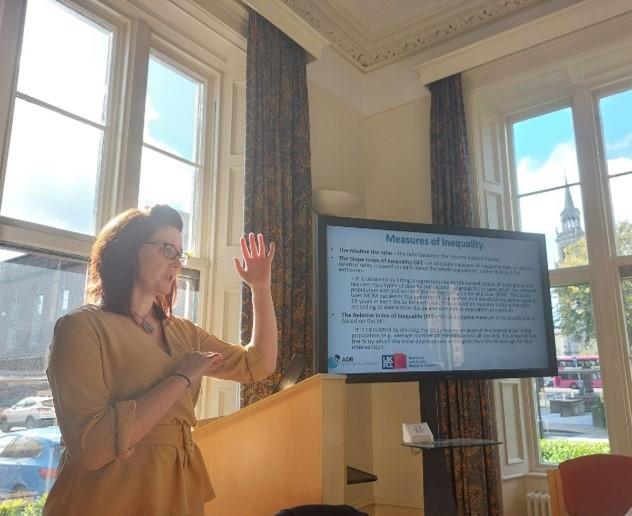
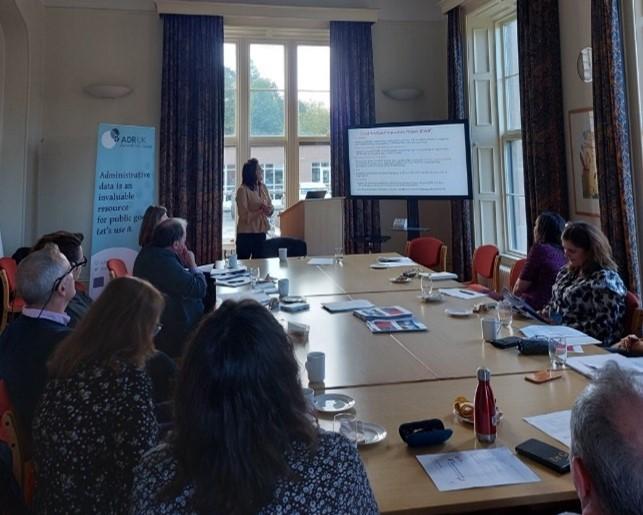
Professor Jones also met with a range of community and voluntary children’s social care stakeholders, facilitated by Children in Northern Ireland (CiNI). In addition, he has had a series of online meetings with Adoption NI and the Independent Fostering Providers Forum. Professor Jones also visited TUSLA at their headquarters in Dublin to hear how children’s social care services are delivered in the Republic of Ireland.
WORKSHOP 2 – CARE EXPERIENCED CHILDREN AND YOUNG PEOPLE
Our second workshop took place in Hazelwood Integrated College on 13 October 2022 with a key focus on children and young people with care experience and their families. 90 people participated, including young people, adoptive parents and foster carers, practitioners, policymakers, service managers, representatives from the community and voluntary sector as well as representatives from statutory agencies. The workshop provided a platform for delegates to share their thoughts, views and experiences on the current issues facing children and young people with care experience and most importantly how services could be improved. Engaging discussions took place from both an individual and group perspective through roundtable discussions.
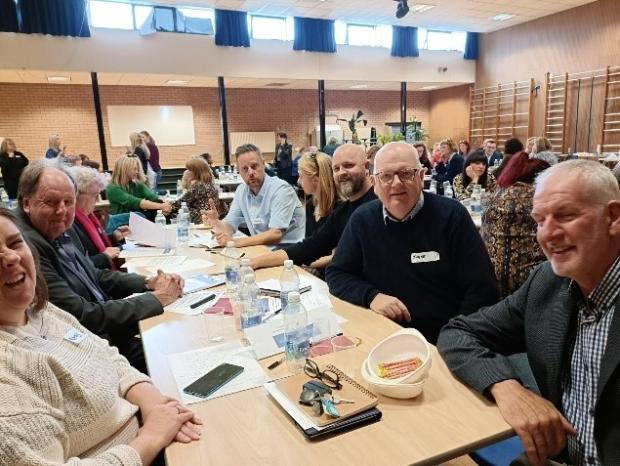
Thank you to the speakers for your thought-provoking presentations that highlighted the key issues impacting care experienced children and young people. Your input is highly valued and will help Professor Jones shape the Review to improve Children's Social Care Services.
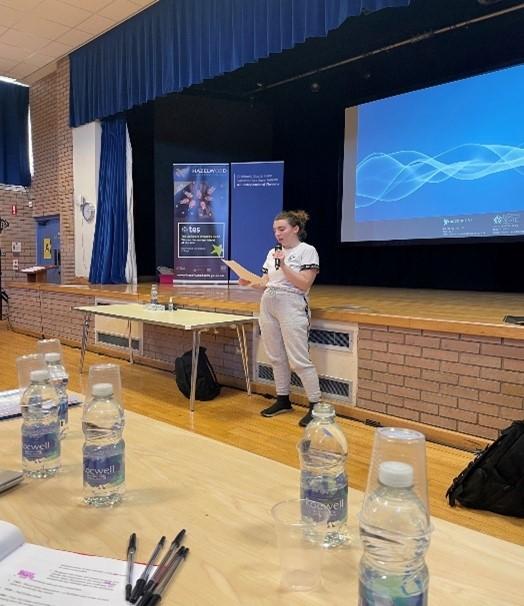
 Rhianna Brown spoke about the key issues within Children’s Social Care from a care experienced young person’s perspective.
Rhianna Brown spoke about the key issues within Children’s Social Care from a care experienced young person’s perspective.
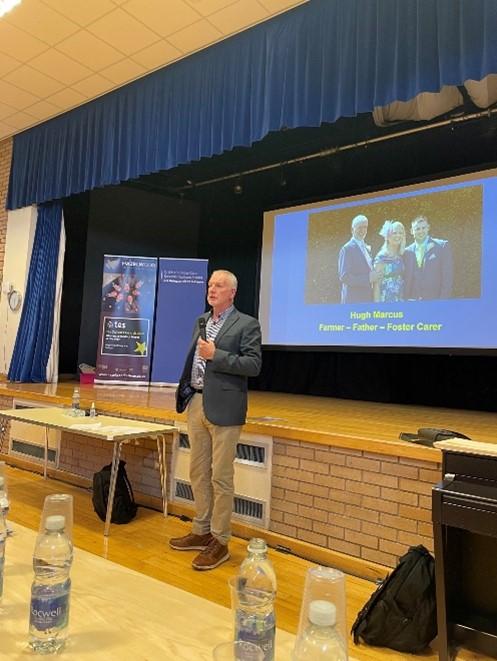
Hugh Marcus spoke about his experiences from a foster carer perspective.
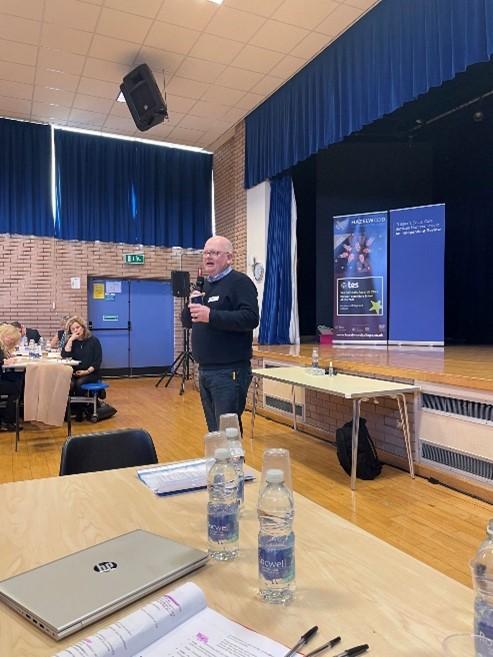
Dave Linton presenting the key issues from the perspective of an adoptive parent.
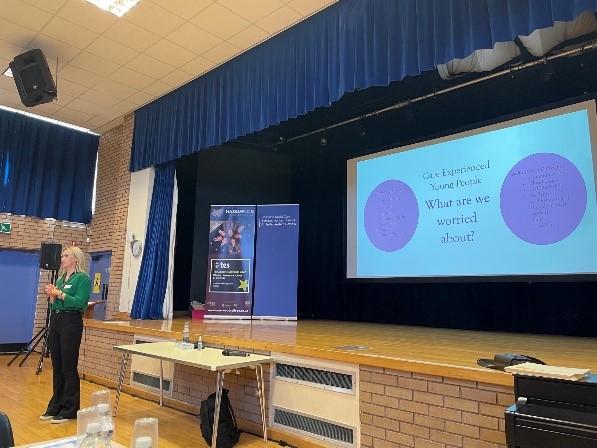
Eimear Rafferty, onsite school social worker highlighted the perspectives of care experienced young people.
WORD OF THANKS TO HAZELWOOD INTEGRATED COLLEGE
Many thanks to Hazelwood Integrated College for hosting the second workshop for the Independent Review for your engagement and contributions on the day; it is much appreciated. A special word of thanks to Patricia and to the catering staff for all their care and commitment in making the event run seamlessly.
We were so pleased and proud to have “attended the best school in the UK” and also to have Head Girl, Adel co-chair the workshop. Thank you to the School Social Worker Eimear for her well-delivered presentation. The messages you gave were very powerful and helped to inform the workshop and the Review.
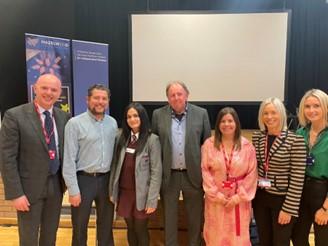
UPCOMING WORKSHOP
Our third Review Workshop will be held on 15th November 2022 in the Junction, Dungannon. This workshop will focus on Family Support Services. Invitations for this workshop will be issued shortly. We look forward to hearing more engaging discussions to help inform the Independent Review.
CONTACTING THE REVIEW
If you wish to get in touch with the Review, you can contact the Review Secretariat team through the Review’s website, accessed here. The website provides information about the Review, details on how to contact us, key documents and latest news. The Review website will serve as a platform to connect with you and to seek your views.
The Review has its own twitter account @cscsreviewNI where you can follow us and view our twitter feed for more updates on the work of the Review.